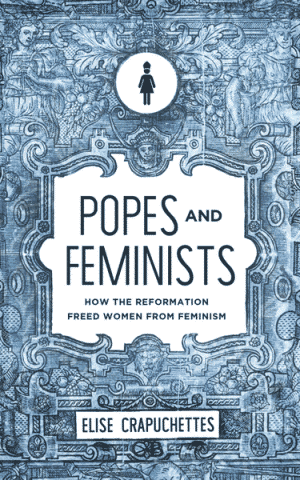save
$1.50Popes and Feminists: How the Reformation Frees Women from Feminism (Elise Crapuchettes)
$14.50$16.00
Part history and part contemporary reflection, Popes and Feminists argues that women today have some of the same choices facing them as women in the sixteenth century. In this fascinating book, published on the five hundredth anniversary of the Protestant Reformation, Elise Crapuchettes shows how the Reformation changed the lives of Christian women as it turned them away from trying to earn their salvation in the convent towards a joyful, liberating view of vocation and work. And that changed their families and the world.
In stock
Popes and Feminists
How the Reformation Frees Women from Feminism
Before the time of the Reformation, in the eyes of the Roman Catholic Church, a wife or mother was not a holy vocation. The only spiritual calling for women was to be found in a convent. The Reformers confronted the bad theology which lead to this (and other worse abuses, like priest-patronized brothels) and returned to the Bible to develop a theology of vocation that began to free women to be “holy” no matter their occupation.
But today, modern feminist claims about vocation have more in common with the pre-Reformation popes than anything else — except feminists have replaced the nunnery with the hallowed corporate workplace. Christian women wondering about their place in society and comparing feminism with the Bible should start with the teaching of the Reformers and the lives of many exceptional women of the Reformation.
Part history and part contemporary reflection, Popes and Feminists argues that women today have some of the same choices facing them as women in the sixteenth century. In this fascinating book, published on the five hundredth anniversary of the Protestant Reformation, Elise Crapuchettes shows how the Reformation changed the lives of Christian women as it turned them away from trying to earn their salvation in the convent towards a joyful, liberating view of vocation and work. And that changed their families and the world.
From the book:
“If a woman understood the biblical doctrines the Reformers were preaching, she should have run as fast as she could out of the convent and into grace (as many nuns did). There is no physical confinement so restricting as the doctrine that a woman has to earn her own salvation and prove her own righteousness. Abandoning the dungeons of pre-Reformation Roman Catholicism meant no more works, no more guilt, no more penances, and no more indulgences. Grace was the greatest liberty a woman would ever have.”
About the Author
Elise Crapuchettes grew up in Mississippi and Texas, graduated with a BA from Baylor, and earned a joint JD/MTS at Duke. She always intended to marry a serious academic with an easy last name. Instead, God gave her an indomitably fun-loving businessman with a memorable last name. Andrew transplanted her to Idaho, where Elise stays home with their five fantastic kids. There, she tries to transform their wild hillside into a formal southern garden.
Table of Contents
- Feminism: A Little Background
- Modern Feminism on Vocation, Marriage, and Motherhood
- The Roman Catholic Church in the Sixteenth Century
- The Catholic Church and Stingy Grace
- Catholic Church and Women
- The Catholic Church’s Ideas about Vocation: Do Something Holy
- Convent Life
- Marriage: A Life for the Less Holy
- A Revolutionary View of Salvation
- New View of Women
- Christian Mother Instead of Catholic Nun
- Protestant Marriage Instead of Catholic Celibacy
- Women of the Reformation
- Faithful Reformer’s Wives
- Other Faithful Women: The Antidote to Feminism
- Protestant Women in Power
- How Modern Feminists View the Reformation
- Societal Changes in the Sixteenth Century: The Reformation Made a Lot of Things Better
- The Reformation and You
- What Does All This Mean for Women’s Vocations?
| Weight | 0.86 lbs |
|---|








